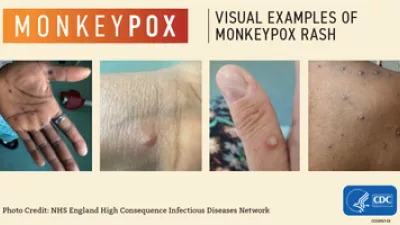Updated August 2, 2022
Mpox is a very rare disease that's normally linked to travel in West and Central Africa. It's somewhat similar to the smallpox virus.
The U.S. Centers for Disease Control and Prevention is currently investigating clusters of mpox in several countries that don't normally report mpox, including in the U.S.
How mpox spreads
A person with mpox can spread it to others from the onset of symptoms until the rash has fully healed (scabs have fallen off) and a new layer of skin has formed. In the current outbreak, mpox is primarily spreading during oral, anal and vaginal sex, as well as other intimate contact such as kissing and cuddling.
The virus can spread through:
- Direct contact with body fluids or sores on an infected person
- By touching materials that have touched an infected person's body fluids or sores, like clothing or linens
- Respiratory secretions during prolonged, face-to-face contact, like a long conversation with a friend, or intimate contact, like kissing or cuddling with someone
Experts are currently studying whether the virus can spread through genital fluids, saliva, feces and other bodily fluids.
People can spread the virus when they have symptoms. Experts are studying whether the virus can spread before symptoms start or after they end.
Mpox symptoms
The illness usually begins within 2 to 3 weeks of exposure. The most common symptom is a rash or sores that look like pimples or blisters. These may be all over the body or just in certain parts, such as genitals, anus, face, arms, hands, legs, feet, chest or back. Sores in the anus or the urethra can make it difficult to go to the bathroom. Some people also have flu symptoms like fever, headache, muscle aches, exhaustion and swollen lymph nodes.
Preventing mpox
To prevent mpox, you can:
- Ask your health care provider whether you might be eligible for the Jynneos vaccine. This is currently in very short supply but being distributed to people who are at highest risk for mpox, including those with a recent exposure to mpox
- Avoid sex and other intimate contact with multiple or anonymous partners
- Avoid contact with materials, such as bedding, that have been in contact with a sick person or animal
- Practice regular handwashing and hand sanitizing, especially after contact with animals or someone who is sick
Treating mpox
There is no specific treatment approved for mpox. Most people get better on their own without treatment. However, antivirals for smallpox may help. Your provider can help determine whether you are eligible for antiviral treatment. They may also be able to provide medication for symptom relief.
If you develop symptoms concerning for mpox, please isolate from others immediately and talk to your health care provider, particularly if you've had close contact with someone who has a confirmed case of mpox.
Learn more by visiting other helpful mpox resources.
Media contact
Taylor Wilson
- 402.559.7037 (Office)
- 402.871.8338 (Cell)
- twilson@nebraskamed.com

In 2018, the United States Department of Health and Human Services awarded Nebraska Medicine/University of Nebraska Medical Center one of two national demonstration grants to address health care preparedness challenges, establish promising practices for improving disaster readiness across the health care delivery system, demonstrate the potential effectiveness of an RDHRS (Regional Disaster Health Response System), and make progress toward building a national system for readiness built on collaboration. The Region VII Disaster Health Response Ecosystem is directed by UNMC’s Global Center for Health Security leaders Shelly Schwedhelm and Dr. James Lawler, and recently launched a new website. For more information, visit Regionviidhre.com.

